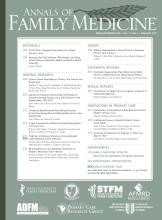Article Figures & Data
Tables
-
A biochemical alteration does not translate directly into an illness. The appearance of illness results from the interaction of diverse causal factors, including those at the molecular, individual, and social levels. And the converse, psychological alterations may, under certain circumstances, manifest as illnesses or forms of suffering that constitute health problems, including, at times, biochemical correlates
-
The presence of a biological derangement does not shed light on the meaning of the symptoms to the patient, nor does it necessarily infer the attitudes and skills that the clinician must have to gather information and process it well
-
Psychosocial variables are more important determinants of susceptibility, severity, and course of illness than had been previously appreciated by those who maintain a biomedical view of illness
-
Adopting a sick role is not necessarily associated with the presence of a biological derangement
-
The success of the most biological of treatments is influenced by psychosocial factors, for example, the so-called placebo effect
-
The patient-clinician relationship influences medical outcomes, even if only because of its influence on adherence to a chosen treatment
-
Unlike inanimate subjects of scientific scrutiny, patients are profoundly influenced by the way in which they are studied, and the scientists engaged in the study are influenced by their subjects
-
Additional Files
Supplemental Appendix
Appendix 1. Clarifying Engel�s Critique of Dualism. Monism And Dualism: An Old and Unfortunate Controversy
Files in this Data Supplement:
- Supplemental data: Appendix - PDF file, 2 pages, 124 KB
The Article in Brief
In the mid-1970s, George Engel, MD, developed a "biopsychosocial model" of medicine. According to this approach, illness has not only medical/scientific aspects but also psychological and social aspects. In this article, researchers expand the biopsychosocial model and suggest ways that it can be a guide for applying medical knowledge to meet the needs of each patient. According to these suggestions, doctors should: (1) be aware of themselves, physically and mentally, in order to be aware of patient needs, recognize errors, and act compassionately; (2) create an atmosphere of trust with patients; (3) keep an open mind and ongoing curiosity about patients and their health; (4) be aware of any bias they might have toward a patient; (5) learn new emotional skills to help diagnose conditions and form stronger relationships with patients; (6) trust their intuition and later try to determine whether a hunch was based on observations that were not easy to describe at the time; and (7) communicate clinical findings to patients in a way that is understandable.







